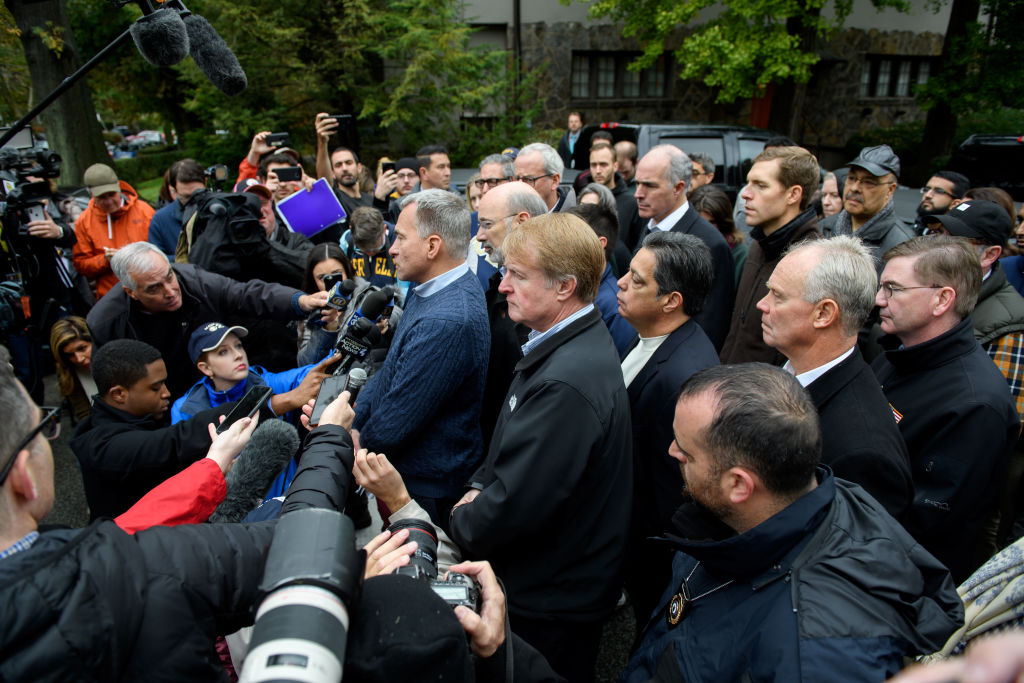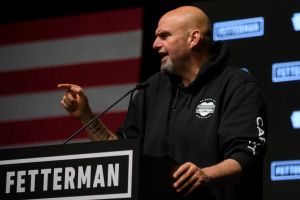‘Once is an accident,’ wrote Ian Fleming in Goldfinger, ‘Twice is a coincidence. Three times is an enemy action.’
That Cesar Sayoc, the Chippendale with a bomb in his pocket, mailed his pipe bombs to leading Democrats is no accident. That Robert Bowers, his paranoia fanned by online incitement, decided to massacre Jews at Philadelphia’s Tree of Life synagogue is not a coincidence. And who would be surprised if tomorrow there was a third action from these enemies of liberal democracy?
The violent actions of Sayoc and Bowers emerge from the long, digitally-enhanced continuum of the right. No president has been more reckless in his public speech than Donald Trump. And most Republicans have followed Trump in being very careless about how they speak, and the company they keep when it comes to winning elections. The paranoid style precedes the paranoid act.
Acts of political violence require targets of violence, targets are created by dehumanisation, and dehumanisation begins with the erosion of civility. This is not the invention of the Internet, though nothing emboldens the online Raskolnikovs like the promise of anonymity — and nothing, let’s face it, can have reinforced Robert Bowers’s sick convictions than logging on to his Twitter account which, until its sudden withdrawal from circulation around noon today, was full of the lowest filth. Civility makes for civilisation. Attacking Jews in particular is a classic symptom of civilisational decay. So, Jack Dorsey, is monetising racism, Holocaust denial and incitements to violence.
Not that you can legislate political violence away. The United States was founded through political violence, and retains a special place of honor for the instigators of the Revolution. Since then, no democratic society has held its leaders to the ultimate account so regularly. Political violence emerges under conditions of social and economic stress. So did the candidacies of Barack Obama and Donald Trump.
My colleague Roger Kimball is right to remind us that Republicans have also received white powder and death threats in the mail. The political tone has deteriorated to the point that partisans of each party deny the other’s legitimacy, frequently on spurious grounds. If you believe that the other side is committing treason by selling America to Vladimir Putin or to George Soros, then violence becomes a patriotic act. The system is so broken that it cannot save itself from itself, but the people can fix it in the work of moments. That, not coincidentally, was the sales pitch that carried first Barack Obama and then Donald Trump to the White House.
If you believe advertising works on consumers — and America’s patterns of consumption since the rise of Madison Avenue suggests that it does — then you must also consider that incitement works on those who buy its promise of violence. Advertising only fools some of the people some of the time, but incitement incites some of the fools all of the time.
Hence the paradox of who is responsible for political violence. Donald Trump is responsible for incitement, but not for the response of the incited. Trump has flaunted his aggression and teased the mob by bellowing hints about short-circuiting the justice system and simply locking her up, or throwing then out, or keeping them out. Obviously, he is not directly responsible for the mental short-circuits of Cesar Sayoc’s roid rage or Robert Bowers’s racism. Yet neither is he free from responsibility.
Trump pandered to the feverish fringe in order to win a foothold in politics, and to mobilise the Republican base against the party leadership. The ‘alt-right’ of 2016 was a continuum running from neo-Nazis in bunkers in Montana to the Republican candidate’s chief strategist. Trump talked violent politics, and now other people have committed political violence. He looked into the sewer and saw votes there. Other people now handle the guns and explosives.
Robert Bowers, as his now-scrubbed Twitter page reveals, despises Trump for being a ‘globalist’ and for not being an anti-Semite. This reduces Trump’s indirect responsibility, but it doesn’t annul it. Neither does the fact that Trump, in his domestic capacity as the father and grandfather of Orthodox Jews, is in that sense, if no other, a model of tolerance and civility. Trump’s 2016 candidacy and campaign tactics invited the racists out of their caves on the Internet and into the mainstream. Similarly, the fact that Trump dropped Steve Bannon months after winning the presidency only reduces his liability. It cannot erase the rhetorical snail trail that he left in his wake.
Political violence rarely manifests equally on both sides of the party line. Lincoln was shot by an actor, a person of no fixed personality, and McKinley by an anarchist of no fixed party. John F. Kennedy and Robert Kennedy were of the party of the left, but were shot by adherents of Soviet and Palestinian socialism, respectively. John Hinckley admitted that, before shooting Ronald Reagan, he had wanted to shoot Jimmy Carter, but had lost his nerve.
That said, since the Eighties, domestic political violence has, like the Chippendales, tended to lead with its right foot. The Unabomber was an anarchist, but Timothy McVeigh was, like Cesar Sayoc, a registered Republican. The presidential candidacy of Barack Obama elicited a record number of threats against his life. He required more physical protection, and earlier in the campaign, than any previous presidential candidate. Those threats did not come from Democrats.
Nor did the Birther libel emanate from pro-Democratic internet and radio outlets. We know which president launched his political career on the back of that libel. We know which party’s elected representatives accepted him as their presidential candidate despite it. We know which party’s registered voters acclaimed him, even as he incited mobs with the demonisation of immigrants to which Robert Bowers also subscribes.
Yes, the Democratic leadership indulges Islamists and anti-Semites while projecting its moral failings onto the Republicans. Yes, the Democratic grassroots are awash in their own rhetoric of paranoia, hatred and delegitimisation. And yes, Democratic leaders have indulged and abetted it, with consequences that may well include a left-wing activist shooting Republican House majority whip Steve Scalise at the 2017 Congressional Baseball Game. All this only confirms that the madness of politics is universal. It also confirms that politicians should choose their words more carefully.
Trump, abetted by the Republicans, has sown the wind. That incites and invites psychopaths like Cesar Sayoc and Robert Bower to impersonate the whirlwind. After all, who was it that said, ‘I am the storm’?
Dominic Green is Life & Arts Editor of Spectator USA.


















